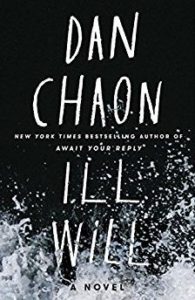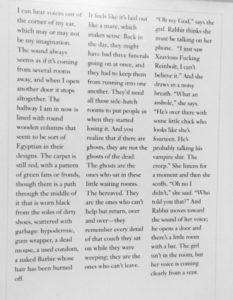 This month, we tread precariously over new territory for Snotty Literati: the landscape of the literary thriller. Dan Chaon’s new novel (he’s already quite accomplished) is both a literary novel and a thriller. Lara is not necessarily a foreigner here; Jennifer pretty much is. In this book, we meet Dustin Tillman, a widower and a psychologist, who is—somehow or other—touched by murder in both his past and present. In 1983, his parents and aunt and uncle are murdered in a Charles Mansonesque mini-slaughter. His adopted, Ozzy Osbourne-loving, drug-taking, rather incestuous, brother is wrongly convicted of the murder—and newly released from prison as a middle-aged man. In the present, a nearby serial killer may be preying upon white and drunk college boys who all mysteriously “drown.” Dustin, who has a white college-aged son, is sucked into the drama when a messed-up cop seeks counseling or hypnotism or old fashioned friendship. It gets crazy.
This month, we tread precariously over new territory for Snotty Literati: the landscape of the literary thriller. Dan Chaon’s new novel (he’s already quite accomplished) is both a literary novel and a thriller. Lara is not necessarily a foreigner here; Jennifer pretty much is. In this book, we meet Dustin Tillman, a widower and a psychologist, who is—somehow or other—touched by murder in both his past and present. In 1983, his parents and aunt and uncle are murdered in a Charles Mansonesque mini-slaughter. His adopted, Ozzy Osbourne-loving, drug-taking, rather incestuous, brother is wrongly convicted of the murder—and newly released from prison as a middle-aged man. In the present, a nearby serial killer may be preying upon white and drunk college boys who all mysteriously “drown.” Dustin, who has a white college-aged son, is sucked into the drama when a messed-up cop seeks counseling or hypnotism or old fashioned friendship. It gets crazy.
Jennifer: My experience is very limited here. I read almost nothing in the thriller genre. I listened to the audiobook of The Girl on the Train by Paula Hawkins (utterly mediocre), and found this to be 100% more compelling. I wouldn’t normally be interested. But I’ve read only a little of Chaon’s other work—and I wanted more. It turned out to be a page-turner for me. I think the literary emphasis on character development worked very well in the thriller-context. What do you think?
Lara: I am also a fan of Chaon’s work, having loved You Remind Me of Me, but this latest effort didn’t do it for me. While the book was multi-layered and had some characters with depth, it didn’t have the same page-turning element that many other thrillers possess. Unlike you, I couldn’t put The Girl on the Train down, errrr, couldn’t stop listening to it. I also listened to Ill Will, via Audible, and I was frequently ready to push pause on Dustin, Aaron, Aqil, Rusty, Kate, and Wave.
Jennifer: I just read your review of You Remind Me of Me, and you used the word exquisite. Wow! Quite a difference.
 This story is told through multiple points of view, in multiple time periods. The effect is to add, maybe, nuanced layer upon nuanced layer. There are also some little narrative tricks, in which Chaon splits the text into columns—and the reader has to navigate through the unorthodox graphics (see photo). I loved the points of view and time-splits; I thought they were gracefully executed. I really didn’t like the column-thing, and this could be because I read it on my kindle. It was not easy to read as an ebook. I did think it had an unusual effect, revealing a kind on James Joycean stream-of-consciousness thingy that’s neat (especially since there’s a lot of drugs involved), but I think I still like my story straight-up. You?
This story is told through multiple points of view, in multiple time periods. The effect is to add, maybe, nuanced layer upon nuanced layer. There are also some little narrative tricks, in which Chaon splits the text into columns—and the reader has to navigate through the unorthodox graphics (see photo). I loved the points of view and time-splits; I thought they were gracefully executed. I really didn’t like the column-thing, and this could be because I read it on my kindle. It was not easy to read as an ebook. I did think it had an unusual effect, revealing a kind on James Joycean stream-of-consciousness thingy that’s neat (especially since there’s a lot of drugs involved), but I think I still like my story straight-up. You?
Lara: Honestly, listening to it on audio meant no stream of consciousness or columned storytelling. It was straight up and I knew who was talking when. I was excited to know that my audiobook narrator crush, Ari Fliakos, was involved in the production (along with several others), but sad when it was just to narrate the opening and closing chapters. The vocal talent for Rusty, Kate, Wave, and Aaron was spot on. The voice of Dustin was too formal and stiff for the way the character was built. Those were my beefs with the story’s format.
Jennifer: Plug for Fliakos! (Actually, though, I think Dustin’s character is strangely stiff and formal. If I were to describe him, I’d say that he’s thoroughly uncomfortable in his own skin. He really doesn’t know who he is.)
Lara: So, you aren’t a big thriller reader, and I am. Ill Will is definitely stronger on character development than the average thriller. But it was shorter on complexity, in that I figured out who the serial killer was WAY early. I think the beauty of a good thriller is that it keeps you guessing until the end. And when you guess right, it doesn’t feel as good as when you are taken by surprise. It just doesn’t. Well, for me, it doesn’t.
Jennifer: I’d probably agree—but I wonder, really, if the goals of the thriller (complexity, suspense, and surprise) might somehow run up against the goals of literary fiction (chiefly—not exclusively—character development). Like, seriously, I didn’t feel that let down feeling. Because I really wasn’t reading for that. I was reading, mostly, for character and language—ever grateful for lines like these:
“Dustin didn’t know what the feeling was that filled him up in such moments. It was something about the way the flashlight’s beam made a glossy bowl of light beneath the water, the way under the beam, everything was clear and distinct—the bits of floating algae and minute water animals, the polished stones and sleepy minnows flashing silver and metallic blue, the crawdads, sidling backward with their claws lifted warily.”
I liked the disturbing psychological/moral/entirely human complexity (that books often lack) in those odd moments, like when Dustin remembers his childhood and thinks, fleetingly, “I would have done it ... He would have chosen Rusty over them.” Moments like these, literary moments, were present throughout. In this scene, Dustin considers his own complexity:
“Maybe he wouldn’t have killed his parents himself, but he knew he’d have let Rusty do it. He would’ve stood watching the house burn down, and then he’d turn and get into the passenger seat of the Jeep, and he and Rusty would have driven off to California to meet Black Sabbath. . . And he saw now that it wasn’t real. That it had never been real . . . and he knew that it was something that he should never, ever think again.”
Lara: I think my favorite character was Dustin’s son, Aaron. Chaon captured his age, independence, naiveté, disdain, and disconnection so well. Aaron’s voice was one of the strongest in the book. And the guy that voiced him for the audiobook was perfectly cast.
Jennifer: I’m glad you mentioned that captured youthfulness, because I thought Chaon did a nice job in writing about how people age, taking on middle-aged out-of-touchness. Dustin—who is, like, pretty much representative of my peer age-group—misses the boat when he talks to his kid. I thought this alluded nicely to part of the aging process.
I think, for me, this novel satisfied some literary cravings. I don’t necessarily have the thriller cravings.
Lara: Here’s the thing. Literary thrillers are harder for me than say, literary fiction or straight thrillers. I want too much from them. I want the suspense, character development, and resolution. I know I don’t need everything tied up in a bow with lit-fic. I guess I am being bit finicky that way. I want the clear cut answers that thrillers, by their very nature, demand. It bugged me that we didn’t have that here.
Jennifer: I think, for me, this is more of a human portrait of a crime scene? One character, Rabbit, says, “I think we can’t even fathom the extent of the depravity and fuckedupness that’s out there.” Elsewhere, Aaron thinks, “There’s this spiral where you can’t stop feeling horrible about your horrible self, and it makes you act more horrible.” That’s what this book is about?
Lara: It certainly could be. You are on to something that I might need to be more open to.
Jennifer: And I do want to mention a couple other poignant passages. Wave offers some interesting musing. She thinks, “Most people seemed to believe that they were experts of their own story. They had a set of memories that they strung like beads, and this necklace told a sensible tale. . .” She concludes that memory fails to get at truth. She asks, “What if we were not actually the curators of our own lives?” I LOVE THAT.
Lara: That is a great line and overall sentiment. There’s a lot in this book about storytelling, memory, meaning, and overall life philosophy. I don’t recall who says these two well-written passages, but they address those overarching themes:
“I realized that I had the choice. I could give this moment a meaning, or I could choose to ignore it. It just depended on the kind of story I wanted to tell myself.”
… and …
“We are always telling stories to ourselves, about ourselves…But we can control those stories…I believe that! Events in our life have meaning because we choose to give it to them.”
Jennifer: And don’t forget he uses words like “addled” and “empathy-buttered.”
Lara: He is very good with words; I’ll definitely give you that.
Jennifer: I think this novel, with its talk of memory and hypnotism, really grapples with the age-old literary preoccupation with Truth. I do think you’re right: the suspense/thriller expectations are compromised.
Next Up!
Join is in May for the 2016 Man Booker Prize Winner for Fiction, The Vegetarian, by Han King.
Until then… happy reading, Snotties!
_______________________________________________________________________
Can’t get enough of Snotty Literati? Follow us on Facebook!
Want to read more from Jennifer? Check her out at www.jenniferspiegel.com
Want to see what Lara is up to? Stay right here at www.onelitchick.com
